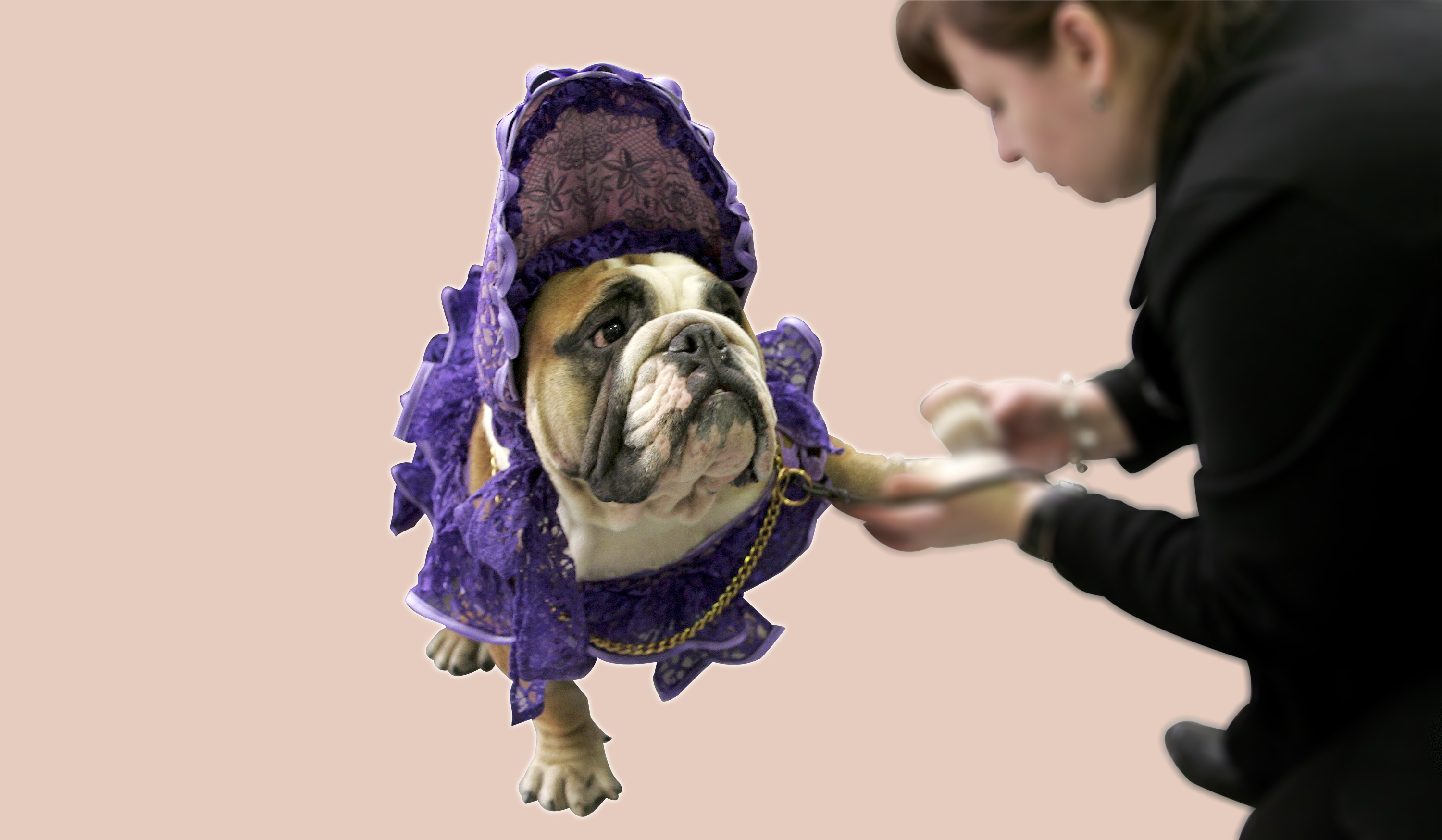Your dog is not a human being. Stop treating her like one.
Throw your dog a bone, not a birthday party


You'd be hard-pressed to find anyone with a deeper love for dogs than Roland Sonnenburg.
Roland, a professional animal trainer, is co-owner of Talented Animals a company with facilities in California, Oregon, and Canada that provides training and support for a wide variety of animals appearing in film and on television. On any given day, Roland might be bonding with a lemur, riding herd on a gaggle of geese... or romping with an entire pack of dogs, including quite a few of his own.
Roland and his partner Lauren Henry adore their dogs and expend a great deal of time, energy, and money caring for them.
The Week
Escape your echo chamber. Get the facts behind the news, plus analysis from multiple perspectives.

Sign up for The Week's Free Newsletters
From our morning news briefing to a weekly Good News Newsletter, get the best of The Week delivered directly to your inbox.
From our morning news briefing to a weekly Good News Newsletter, get the best of The Week delivered directly to your inbox.
What don't these canine experts do?
Treat their dogs like humans. They don't dress them in adorable outfits every day; they don't give them ice cream for dessert on a regular basis, either. They certainly don't expect their pooches to be entertained by the television when they're left alone at home all day.
"Seeing your dog as a 'little-furry-human' isn't necessarily wrong," says Roland, who is a proponent of positive relationships between people and their pets. "But it is a failure to accurately see them as what they are... what they want, and what they need."
Many people who love their dogs make the mistake of expecting them to enjoy the same things people do.
A free daily email with the biggest news stories of the day – and the best features from TheWeek.com
Even worse, well-meaning pet owners often expect a dog to behave as a person would in certain circumstances. This is not only unkind and unfair to the animal; it can also be downright dangerous. The popularity of social media videos showing patient family dogs tolerating increasingly rambunctious toddlers and running off-leash in potentially dangerous circumstances concerns Roland.
"One of our core responsibilities is to keep our pets safe," he says. "How many dogs are injured each year because they dash into the street after a squirrel or chew on an exposed power cord or get in a fight with another dog while not properly supervised? I suspect one of the most common phrases uttered at the Emergency Room at the veterinarian's is, 'Well, she never did that before.'
"But dogs do these things all the time! We humans have a sense of the future; we understand long-term consequences. Dogs don't. They rely upon us to make good decisions that will keep them safe."
And it's not only your beloved pet who can be hurt when you project expectations of human behavior onto her. Roland recalls an incident he read about in which a dog got loose and killed several free-ranging chickens; the dog was labeled a "killer" and there was an outcry to euthanize her.
"It breaks my heart to see people surprised and disappointed when their dogs act like dogs. While I can share sadness about the chickens, this dog did nothing wrong in the realm of canine behavior. All dogs are carnivores — predators — and in the wrong situations, most will kill. Similarly, how many people expect their dogs to always be perfect with cats, or small children?"
So stop thinking your dog is just like "Nana" from Peter Pan. She's not, and if she snaps at little Tristan after having her tail pulled one time too many, it won't be her fault. That's how adult dogs manage pesky puppies.
Conversely, don't make the mistake of trying out canine behaviors in order to manage your relationship with your dog, either.
"I remember a lady with a very strong-willed Giant Schnauzer who wanted to be in charge," Roland recounts. "Some trainer told her to growl in the dog's face. The dog, not unreasonably, decided that they were going to deal with this like dogs, and put her in the hospital."
There are less serious, but still important downsides to projecting human abilities, needs, and desires onto your dog. Consider diet:
"People who see their pets as human babies tend to have obese pets," Roland observes. "They think dogs should eat as frequently as humans, despite the fact that canids have evolved differently. They also tend to feed what the dog finds most yummy rather than what will make the dog healthy."
"A friend recently asked me to advise him because his dog had become seriously overweight. I watched him feed her dinner, and I had to bite my tongue as he poured cream and gravy and hid treats in the food, said a big 'I love you!', and gave her the bowl. I asked about all the added yummies and extra affection, and he explained that if he did not do this, she would only eat a bite or two and leave her food."
"The poor dog was actually trying to self-limit her consumption, but he was doing everything he could to lure her to overeat! Other people give their dogs human food because they say the dog enjoys it so much, and the extra food is an expression of love. Love is great, but shouldn't it be guided by reason? Feeding your pet into illness and discomfort is hardly kind."
Then there is exercise — for both body and mind. Most people wouldn't elect to jump off a dock into a freezing cold lake in the middle of winter in hot pursuit of a tennis ball... or to spend hours trying to knaw a tasty treat out of a Ruffhide... or learning tricks such as "roll over" and "say hello"... but many dogs absolutely love and need to do this.
Roland explains. "Many novice dog owners try to make their pets' lives easier, while more experienced owners know enough to make their dogs' lives richer. Most dogs love challenge — they feel joy upon accomplishment!"
So go ahead. Throw that stick further and further each time. Throw it into the waves at the beach! Hide a favorite toy in the house and urge her to find it. You might not be too excited if someone asked you to engage in these activities, but your dog will love them. And you might find yourself rewarded by a glimpse into another world.
"Every moment we spend with our pets, they give us the amazing gift of a remarkably different perspective," Roland says. "I am not sure what non-dog-owners do when walking in the woods or on the beach, but for me it is all about finding adventures. A stump for Sequel to jump on, a steep hill for Saga to climb, a dock for Quest to leap from…"
"Those of us who share our lives with animals ought to feel empowered, even obliged, to understand their emotions and feelings," he concludes. "To have authentic relationships with our pets, we need to listen, observe, and consider their perspective. In order to do this, we need to remove preconceptions and assumptions and be open to their truth."
So take Fluffy out of your purse and let her chase her own truth. And maybe even her tail.
Leslie Turnbull is a Harvard-educated anthropologist with over 20 years' experience as a development officer and consultant. She cares for three children, two dogs, and one husband. When not sticking her nose into other peoples' business, she enjoys surfing, cooking, and writing (often bad) poetry.
-
 A running list of the US government figures Donald Trump has pardoned
A running list of the US government figures Donald Trump has pardonedin depth Clearing the slate for his favorite elected officials
-
 Ski town strikers fight rising cost of living
Ski town strikers fight rising cost of livingThe Explainer Telluride is the latest ski resort experiencing an instructor strike
-
 ‘Space is one of the few areas of bipartisan agreement in Washington’
‘Space is one of the few areas of bipartisan agreement in Washington’Instant Opinion Opinion, comment and editorials of the day
